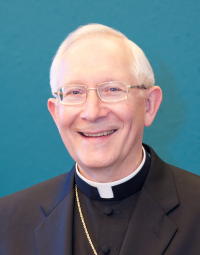
Archbishop Leonard P. Blair
When I was about to be ordained a bishop in 1999, I was required to make a “Profession of Catholic Faith” and an “Oath of Fidelity.” I remember that this took place at a vesper service for the clergy of the diocese. I also remember afterward overhearing one priest say to another that he could never be a bishop if he had to agree with all these things. I was scandalized and saddened to overhear this, but not surprised, given the upheaval in the Church and the world that we had been experiencing for almost a half century.
In hindsight, I can say that at least that priest was a man of integrity for saying he would not take an oath that swore him to things he did not believe. In today’s climate of moral relativism, there are people who would not hesitate to swear to something or profess something falsely as being just a matter of mere words.Perhaps you have heard the term “cafeteria Catholic.” This refers to people who believe they can choose, define or interpret Church teaching to suit their own thinking. The last half-century has made it painfully clear that not all “cafeteria Catholics” are laity, as the priest mentioned above exemplifies. Any number of clergy and religious men and women over the years have dissented from Catholic faith and morals, either denying, falsifying or distorting the truths of faith and what is required for a holy and virtuous life in keeping with the Gospel.
At the opening of our Archdiocesan Synod, I said, “a Profession of Faith is not a dead letter. It is inspired and upheld by the Holy Spirit in faithful hearts. St. Boniface, an Englishman who brought Christianity to what is now Germany in the eighth century, and who was martyred there for the Faith, once wrote: ‘The truth can be wearied, but it cannot be overcome.’”
As members of the Church, we must hold fast to the truths that the Church believes and teaches, while at the same time seeking, in the words of Pope Francis, to “accompany” those whose situations are not in accord with that teaching. Love without truth, and truth without love, are both distortions that degenerate into ideologies. Love and truth are at the heart of the Profession of Faith, and they are inseparably the only way forward for the Church.
